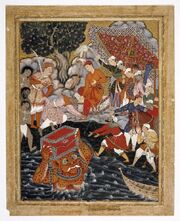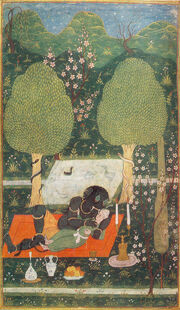
An Ifrit named Arghan Div brings the chest of armor to Hamza.
Ifrit—also spelled, efreet, efrite, ifreet, afreet, afrite, and afrit (Arabic: ʻIfrīt: عفريت, pl ʻAfārīt: عفاريت)—is a term used for a powerful jinni. An ifrit is sometimes depicted as being enormous both in height and girth and, often, as having horns on the head and hooves instead of feet. Ordinarily they in habit underworld, ruins, and desert wastelands, but the people of Kenya on the east coast of Africa believe that they lurk in the muddy depths of pools and rivers. Ifrits live in a society structured along ancient tribal lines, complete with kings, tribes, and clans. They generally marry one another, but they can also marry humans.
While ordinary weapons and forces have no power over them. An ifrit may be either a believer or an unbeliever, good or evil, but they are most often depicted as a wicked and ruthless beings.
There, like the English Nursery bogie Jenny Greenteeth, they seize unattended children by the legs and drag them to their deaths. According to Arabic legend, King Solomon compelled an Ifrit to become his servant. Lord Byron, ever interested in the romantic legends of the Middle East, wrote an Ifrit into his work "The Giaour."
Etymology[]
Western philologists, such as Johann Jakob Hess and Karl Vollers, attribute the word to Middle Persian afritan which corresponds to Modern Persian آفريدن ("to create").
Ifrit in Islamic scripture[]

Makhan embraced by an ifrit. Illustration to Nizami's poem Hamsa. Bukhara, 1648.
An Ifrit is mentioned in the Qur'an, Sura An-Naml (27:39-40):
An ifrit (strong one) from the jinn said: "I will bring it to you before you rise from your place. And verily, I am indeed strong, and trustworthy for such work." One with whom was knowledge of the Scripture said: "I will bring it to you within the twinkling of an eye!" Then when Solomon saw it placed before him, he said: "This is by the Grace of my Lord - to test me whether I am grateful or ungrateful! And whoever is grateful, truly, his gratitude is for (the good of) his ownself; and whoever is ungrateful, (he is ungrateful only for the loss of his ownself). Certainly my Lord is Rich (Free of all needs), Bountiful.
In Arabic literature[]
In One Thousand and One Nights, in a tale called "The Porter and the Young Girls", there is a narrative about a prince who is attacked by pirates and takes refuge with a woodcutter. The prince finds an underground chamber in the forest leading to a beautiful woman who has been kidnapped by an ifrit. The prince sleeps with the woman and both are attacked by the jealous ifrit, who changes the prince into an ape. Later a princess restores the prince and fights a pitched battle with the ifrit, who changes shape into various animals, fruit, and fire until being reduced to cinders. In the book the word is used interchangeably with genie and in the tale the spirit is malevolent but easily tricked by the protagonist.
In medieval Iranian literature, the word ifrit often denotes an African.
In early folklore, the ifrit is said to be formed from the blood of a murder victim. Driving an unused nail into the blood was supposed to stop their formation. The creatures were reported as being able to take the form of Satan, the murder victim or even a sandstorm.
In modern literature and culture[]
Stories of ifrits were highly prevalent in Egyptian culture up until the Second World War. British soldiers visiting the pyramids reported that they had been warned by the locals of ifrits living in the desert in the form of a dog which would lead them astray until they became lost. At this time Ifrits were also said to have the power to turn humans into animals themselves.
In many of the games in the Final Fantasy series by Square Enix, Ifrit (sometimes translated as Djinn) appears as a fire-elemental summon that attacks all enemies on the screen.
In the video games Tales of Symphonia, Efreet appears as the summon spirit of fire. As such, he has dominion over all flame related mana. In his official artwork and character sketches, he appears as a masculine, red giant with a horned head, and a serpentine tail.
In the novel American Gods by Neil Gaiman an Ifrit poses as a New York taxi driver in modern day New York, and has a sexual encounter with a character named Salim. This event causes them to switch lives.
In the HBO Series True Blood an Ifrit is the antagonist of Terry Bellefleur during Season 5.
In the game Heroes of Might and Magic 3 Efreet are the Inferno town's tier six unit whose upgraded form are Efreet Sultans.






